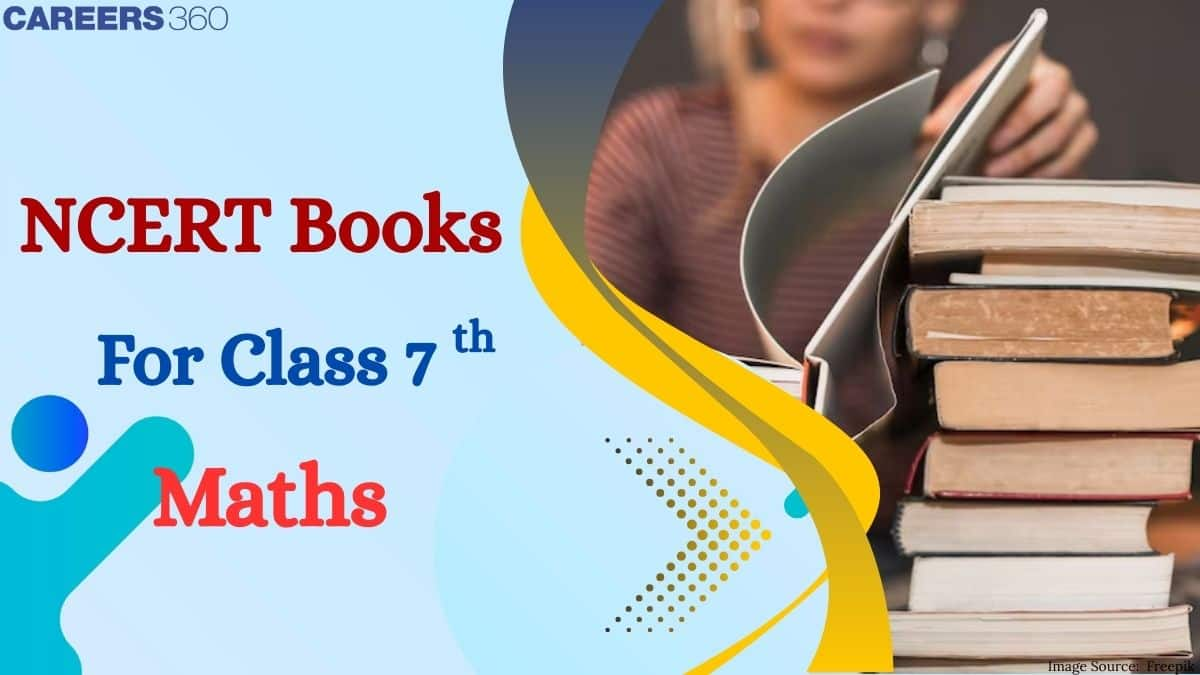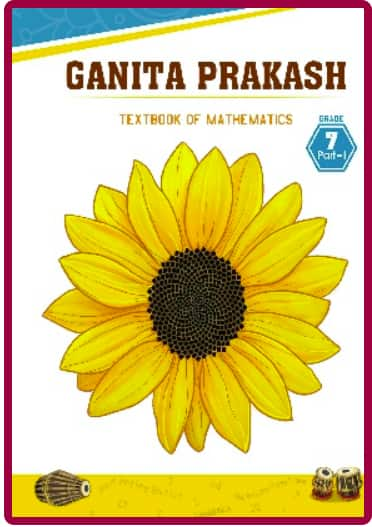NCERT Books for Class 7 Maths – Download PDF Free (2025 Edition)
What if maths could be as fun as playing a game? NCERT books for class 7 Maths will help you learn math more easily, along with some fun activities. Following the National Education Policy (NEP) 2020 and the National Curriculum Framework for School Education (NCF-SE) 2023, this book comprises eight chapters, as opposed to the 15 chapters included in the previous year. From Arithmetic to Algebra, from Geometry to Puzzles, the new NCERT Maths textbook covers it all. These NCERT books for Class 7 are trusted by many teachers and loved by students. This year, the Class 7 Maths book has only been released in one language, i.e., English.
This Story also Contains
- Download NCERT Books for Class 7 Maths PDF
- NCERT Books for Class 7 Maths 2025-26: Chapter Wise
- How to Download Free NCERT Books for Class 7 Maths PDF?
- Preparation Tips for Class 7 Maths
- NCERT Solutions for Class 7 Maths
- NCERT Books for Class 7 Maths – Previous year Syllabus Chapters
- NCERT Class 7 Books for Other Subjects
- NCERT Syllabus for Class 7

A good Maths book is not just for learning formulas; they are for building confidence. This book not only explains the concepts with the help of solved examples but also guides students to understand the “why” behind the answers. NCERT books enable students to acquire more knowledge in a fun and engaging way. At Careers360, we share downloadable NCERT Class 7 Maths books PDF links developed by maths industry experts, so that students can access them at any time from anywhere. Whenever students have any doubts regarding the exercises, they check the NCERT Solutions to clear their doubts and learn multiple approaches to solve a problem. Many teachers recommend NCERT Solutions because they closely match the exam pattern. For full syllabus coverage and solved exercises as well as a downloadable PDF, please visit this NCERT article.
Download NCERT Books for Class 7 Maths PDF
Students can download the Class 7 NCERT Maths book from the link below and read it offline. It follows the latest NCERT syllabus for the year 2025–26.
|
Title |
Download Link |
|
NCERT Books for Class 7 Maths |
NCERT Books for Class 7 Maths 2025-26: Chapter Wise
The Class 7 Maths book consists of 8 chapters. Here is a brief overview of all the chapters, along with the PDF download link.
|
Chapter Number |
Chapter Name (English) |
Chapter Name (Hindi) |
|
1 |
हमारे आस-पास की बड़ी संख्याएँ | |
|
2 |
अंकगणितीय व्यंजक | |
|
3 |
बिंदु के पार एक झलक | |
|
4 |
अक्षर-संख्या का उपयोग कर व्यंजक | |
|
5 |
समानांतर और प्रतिच्छेद रेखाएँ | |
|
6 |
संख्याओं का खेल | |
|
7 |
तीन प्रतिच्छेद रेखाओं की कहानी | |
|
8 |
भिन्नों के साथ काम करना |
This is the official NCERT cover page of the Class 7 Maths book “Ganita Prakash”.

How to Download Free NCERT Books for Class 7 Maths PDF?
Here’s a quick way to download the Class 7 Maths NCERT book in PDF format.
-
Go to the official link: https://ncert.nic.in/
-
Search "Textbook" in the search bar on the upper right-hand side of the site.
-
"Textbooks PDF (I-XII)" will show up. Click on this.
-
Choose ‘Class VII’ from the "Select class" dropdown and select "Mathematics" from the "Select Subject" drop-down list.
-
Now choose the name of the book: “Ganita Prakash” for English and click on the “Go” button.
-
All the relevant chapters, according to the latest NCERT syllabus, will show up on the left-hand side of the screen.
-
Click on "Open" for the chapter you want to download. For example, if you want to download chapter 6, Number Play, click on the "Open" link beside chapter 6.
-
Then, you can see the download option of the PDF on the upper right-hand side of the PDF beside the "Print" option. Click on that to download the chapter.
Preparation Tips for Class 7 Maths
Class 7 Maths is an important step in a student’s learning journey. The NCERT Class 7 Maths textbook introduces students to new and interesting concepts that build on what was learned in earlier classes. This year, students will learn topics like Number systems, Geometry, Algebra, Fractions, etc. Assess the NCERT Syllabus for Class 7 Maths and prepare a study plan for a week. Follow this routine for 1 month and then change it accordingly.
Here are some more tips for every chapter that students can use during preparation.
-
For Chapter 1, revise the place values chart first and understand how the big numbers can be written or read. Also, focus more on approximating the values and word problems.
-
For Chapter 2, understand the BODMAS rule first. It will help you with simplification problems.
-
For Chapter 3, understand the decimal place values such as tenths, hundredths, thousands, etc. and practice to compare them. Try to solve 5 to 10 measurement-based problems in a week for more efficiency in this chapter.
-
For Chapter 4, memorise the Algebraic expressions and their derivation. This chapter can be mastered through thorough practice because of the nature of the topics in this chapter, such as pattern recognition in calendars, mathsticks, etc.
-
Chapter 5 is the 1st Geometry chapter in class 7. To ace this chapter, revise the definition and properties of the angles. Use diagrams to understand transversals and parallel lines better.
-
For Chapter 6, revise the properties of odd and even numbers. Memorise the divisibility rules for 2 to 11 and write them in a separate notebook to revise time to time. Learn about the Fibonacci sequence and its patterns.
-
Chapter 7 can be considered a very important chapter, considering the topics included in it. To master this chapter, focus on the classification of triangles by sides and angles. Memorise and practice the angle sum property, exterior angles property, triangle inequality property, etc.
-
For Chapter 8, practice fraction multiplication and division carefully. Solving various word problems related to this chapter can help students score high. Also, pay attention to simple things like dividing by a fraction means multiplying by its reciprocal.
NCERT Solutions for Class 7 Maths
Careers360 brings together all Class 7 Maths NCERT solutions here for quick and simple student access.
NCERT Books for Class 7 Maths – Previous year Syllabus Chapters
It’s important to know which chapters were part of last year’s Class 7 Maths syllabus. Here is the list of chapters from the previous NCERT Class 7 Maths book.
Chapter 1 - Integers
Chapter 2 - Fractions and Decimals
Chapter 3 - Data Handling
Chapter 4 - Simple Equations
Chapter 5 - Lines and Angles
Chapter 6 - The Triangle and Its Properties
Chapter 7 - Congruence of Triangles
Chapter 8 - Comparing Quantities
Chapter 9 - Rational Numbers
Chapter 10 - Practical Geometry
Chapter 11 - Perimeter and Area
Chapter 12 - Algebraic Expressions
Chapter 13 - Exponents and Powers
Chapter 14 - Symmetry
Chapter 15 - Visualising Solid Shapes
NCERT Class 7 Books for Other Subjects
Explore the following links to check the NCERT books for the rest of the Class 7 subjects.
NCERT Syllabus for Class 7
A syllabus is always an important piece of the puzzle during the preparation for any exam. It gives an idea about the topics to be covered, helping students understand what they need to learn and prepare for exams effectively. Browse the following links to check the NCERT syllabus for 7 of various subjects.
Frequently Asked Questions (FAQs)
According to the new syllabus, there are 8 chapters in the NCERT Class 7 Maths textbook.
Here are the names of the chapters.
Chapter 1: Large Numbers Around Us
Chapter 2: Arithmetic Expressions
Chapter 3: A Peek Beyond the Point
Chapter 4: Expressions Using Letter-Numbers
Chapter 5: Parallel and Intersecting Lines
Chapter 6: Number Play
Chapter 7: A Tale of Three Intersecting Lines
Chapter 8: Working with Fractions
Yes, the official NCERT website provides free PDF downloads of the Class 7 Maths book. Also, you can download the NCERT Maths book of class 7 for free from this article by Careers360. Also, there are several important links regarding class 7 that are attached to this article.
Students can practice from NCERT Exemplar problems, sample papers, and other practice books such as RS Aggarwal to strengthen their skills.
Yes. Many state boards, such as Karnataka, Madhya Pradesh, Rajasthan, Gujarat, and Delhi, recommend NCERT books because of their clarity and standard explanations.
Yes, NCERT books are sufficient for school exams as they explain each concept clearly with solved examples and exercises. Students can practice from other books for competitive exams, such as Olympiads.
Popular Questions
Courses After 12th
Applications for Admissions are open.
As per latest syllabus. Physics formulas, equations, & laws of class 11 & 12th chapters
JEE Main Important Chemistry formulas
Get nowAs per latest syllabus. Chemistry formulas, equations, & laws of class 11 & 12th chapters
JEE Main high scoring chapters and topics
Get nowAs per latest 2024 syllabus. Study 40% syllabus and score upto 100% marks in JEE
JEE Main Important Mathematics Formulas
Get nowAs per latest syllabus. Maths formulas, equations, & theorems of class 11 & 12th chapters
